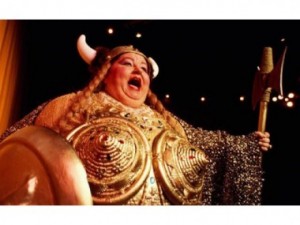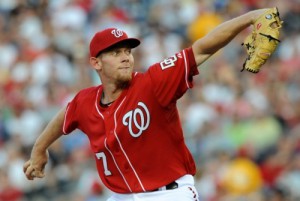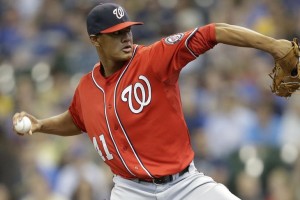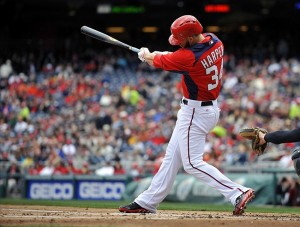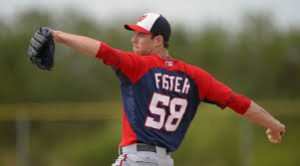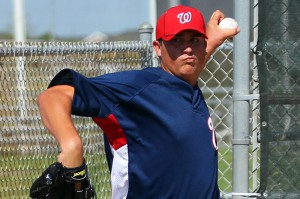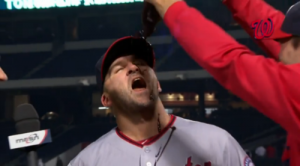Per KW’s comment suggestion, here’s a “State of the Nats” at the halfway point of 2015.
Salient key phrase: “Holding On.” Lets look at some component parts.
Offense
Here’s the full-strength outfield lineup the Nats would optimally like to deploy: Span, Rendon, Harper, Zimmerman, Werth, Desmond, Ramos, Escobar.
Here’s what they lined-up against Red’s ace Johnny Cueto a few days ago: Taylor, Espinosa, Harper, Ramos, Robinson, Uggla, Desmond, den Dekker. Yeah, its no wonder they wimpered into the night as Cueto threw a 2-hit shutout. If you’re Cueto, you pitch around Harper (who got a hit and a walk), you attack the rest of the lineup (strike-out prone lead-off hitter Taylor took a hat-trick), and you laugh as you blow through the rest of the lineup (11Ks on the night).
That’s five regulars out, but not just any regulars; the D/L includes your expected #1, #2 #4, and #5 hitters. Instead they are replaced by a rookie (Taylor), a career minor-leaguer (Robinson), a cast-off veteran failure (Uggla), a career .230 hitter who the team has spent the last 3 years trying to replace (Espinosa) and a 4th/5th outfielder with just a couple hundred MLB at-bats prior to this year (den Dekker).
Frankly, its a miracle the team is in first place. Only by the grace of Harper’s incredible season does this team manage to stay in games. For the record, at the halfway point Harper leads the league in bWAR (6.1), OBP, Slugging, OPS and OPS+. After having a 3-1 K/BB ratio last year, this year he basically has as many walks as strike-outs, one of the primary reasons his average is 60 points higher and his OBP is 130 points higher than it was last year. Hold your breath that Harper doesn’t crash out and miss a month with some injury like he’s done in the previous seasons. If he ends the season with this level of an adjusted OPS+, it’ll be one of the 10-12 best offensive seasons in the history of baseball.
Ironically, even given all these injuries the Nats aren’t even close to what some other teams are dealing with; per mangameslost.com, we’re not even close to what the Mets, Rangers, Rays or Oakland has had to deal with. Though I’d venture to say that perhaps the games lost by Nats players are slightly more “important” than the cumulative games lost by some of these other teams. I don’t care who you are; if you remove four of the top five batters from any team’s lineup, they’d be lucky to be out of the cellar.
The team has gotten absolutely nothing from presumed bench players McLouth and Johnson (Do you think Rizzo will *ever* buy a 4th outfielder for 8-figures again in his life?). Guys who should be in AAA are getting starts and (at least in the case of Robinson) holding their own. We talked before the season about where Taylor should be (on the MLB bench or in AAA getting starts) … well he’s getting playing time, for better or worse. Instead of worrying about whether Moore was going to get DFA’d to make room, we’re *adding* guys to the 40-man like Burriss to help out.
Rotation
We know about Scherzer. He’s been amazing, should start the NL All-Star game (of course, he’s scheduled to throw the series ender in Baltimore so we’ll see) and he leads all NL pitchers in bWAR.
What about the rest of the rotation? Both Fister and Strasburg have missed a handful of starts, and the Nats have tried a whole AAA-rotation worth of replacements to varying results. With apologies to “short sample size judgements” I’ll say that Ross was good, Hill has been ok, Cole has been bad, and Jordan has been worse. Of course, both Cole and Jordan’s delta between ERA and FIP is massive, so their poor ERAs are unlucky to a certain extent. In the meantime, Ross has a 23/2 K/BB ratio and a FIP of 1.11 in his three starts. Its safe to say that this person is excited to see what he can do next, and for me he’s at the head of the line for 2016 rotation candidates.
Clearly we know Strasburg has had an off season. But so has Fister. And Gonzalez‘ ERA is in the 4’s. Just how bad is this rotation? Not as bad as you think; they’re ranked 8th in the league in starter ERA but are 1st in FIP and fWAR. Last year they were 1st in all of these categories. So perhaps we can expect some “progression” in the 2nd half as (hopefully) guys like Strasburg clean up their act and pitch closer to their FIPs than their ERAs.
Bullpen
We knew Rizzo had weakened the bullpen from 2015, which could have been fine had the injury bug not hit. But the turnover of this bullpen has caught up to the team in some ways.
- End of 2014: Soriano, Storen, Clippard, Stammen, Thornton, Blevins, and Detwiler.
- As we stand now: Storen, Janssen, Treinen, Carpenter, Thornton, Rivero, and Roark.
That’s a lot of turnover. Yes Storen has been typically excellent (as long as its not the post-season, he seems to be one of the most reliable closers in the game). As we speak, the bullpen is 11th in ERA; last year they were 4th as a bullpen. Janssen’s injury did not help, as it pushed guys into the 8th inning role they weren’t ready for. And we saw Treinen and Barrett struggle (3.69 and 5.06 ERA’s respectively). Granted their FIP shows that those ERAs are unlucky … but those are still runs on the board, blown leads, blown saves. Roark (predictably) has regressed as he’s pitched in practically every role a pitching staff has (long-man, mop-up, spot-starter, rotation guy, middle reliever, setup guy and even a closer). Luckily the gambler Rizzo has gotten pretty good performance out of scrap heap guys like Thornton and Carpenter, both of whom have given the team good innings.
Will this last? It better: there’s practically nothing left in the farm system for reinforcements. Barrett is set to return soon (probably pushing Carpenter to AAA), but the other options in the minors do not inspire confidence. Martin got shelled (unfortunately; we were all cheering him on after his call-up and his fantastic start). Grace and Solis were both mediocre in their auditions, and I can’t quite figure out why Erik Davis is even still on the roster. Maybe the team will try some more waiver claims or trades (Neftali Felix just got DFA’d…) to shore up middle relief.
Streaks
Lets talk about streaks. As of the time of this posting, the Nats season can neatly be fit into these four periods, and then talk about what spurred the beginning/ending of each streak.
- The Slow Start: 7-13 from opening day through 4/27/15. The team came out of the game 7-13, thanks to a sputtering offense and a make-shift lineup still trying to gel.
- The Comeback: 21-6 from 4/28/15 to 5/27/15: Uggla hits his sole homer on the season to spur a pretty incredible 13-12 comeback win in Atlanta, and the team goes on a 21-6 tear following it.
- Rotational Worries: 6-13 from 5/28/15 to 6/19/15. Strasburg lasts just 5 batters on his 5/28/15 start, putting 40% of the rotation on the D/L and throwing the rhythm of the pitching staff off.
- The Kid dazzles: 12-5 from 6/20/15 to 7/9/15; A long road trip/tough schedule stretch ends with a dominant Ross performance at home 6/20/15, kicking off an easy stretch in the schedule and a mostly full-strength pitching rotation.
Definitely a streaky team so far. At 7-13, they were 8 games back. At the end of their 21-6 streak, they were 1.5 games up in the division. Despite their 6-13 stretch the only lost 3 games in the standings as the Mets faltered equally, and as of 7/9/15 they’re still 3 games up despite getting dominated at home by the Reds.
The team is beating who they should be beating (9-3 against Atlanta, 8-5 against Philly). And they’ve had some success against other teams that are “good” this year (3-1 against the Yankees, 3-0 against Pittsburgh, and a sweep of San Francisco). But they’re inexplicably bad against Cincinnati (0-5?), Miami (2-4), and were expectedly weak against the rest of the AL East (a combined 3-7 against Boston, Tampa Bay and Toronto). I’m guessing they’ll struggle against Baltimore this coming weekend since they sputtered against Cincinnati.
Lets just say that the All-Star break is coming at a pretty good time for this team.
Where do we go from here?
The Nats should be healthier coming out of the all-star break. And they’ll need it; their July schedule is tough. They host the Dodgers and the Mets to start, then travel to Pittsburgh, Miami and New York. That’s a slew of games against good teams and their primary divisional rivals.
In August they host some bad teams (Arizona, Milwaukee, Colorado) but they also do their big West Coast trip (at Los Angeles, San Francisco and Colorado). They also get a 3-game set at St. Louis that could be an eye-opener for where they really stand ahead of the playoffs. September features practically all divisional games against teams that should all be completely out of it by then, so I forsee a team in cruising mode.
Playoff Outlook
The Nats remain in 1st place despite all their issues, and their closest rival is putting out a lineup that most AAA teams could beat. Philly is already 30 games under .500. Miami is 15 games under .500 and just lost their best player. Atlanta sits around .500 but isn’t really trying for 2015 and won’t spend to compete. So I think its safe to say the Nats are winning the division. I’ll guess the Mets hang around since their pitching is so good, but in the end the Nats win the division by at least 10 games.
If the season ended today, Pittsburgh hosts the Cubs in the WC, St. Louis hosts the WC winner and Washington would be traveling to Los Angeles to open the playoffs. And frankly its hard to see this changing much between now and October 1st. I don’t think its a stretch to say that the Nats would be underdogs to both the Dodgers and the Cardinals in a playoff series, not unless Strasburg remembers how to pitch again or the offense gets healthy in time. Are we looking at another first round playoff exit?
